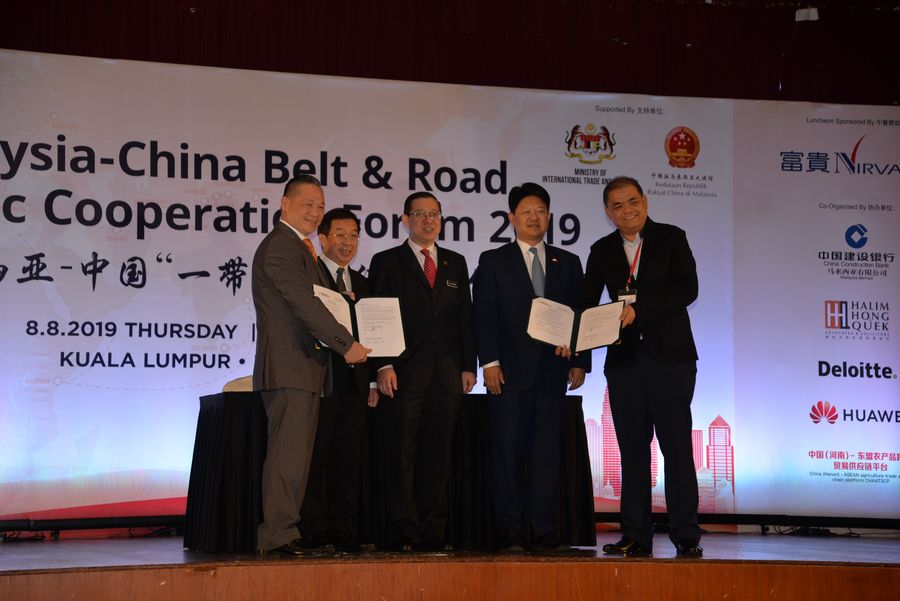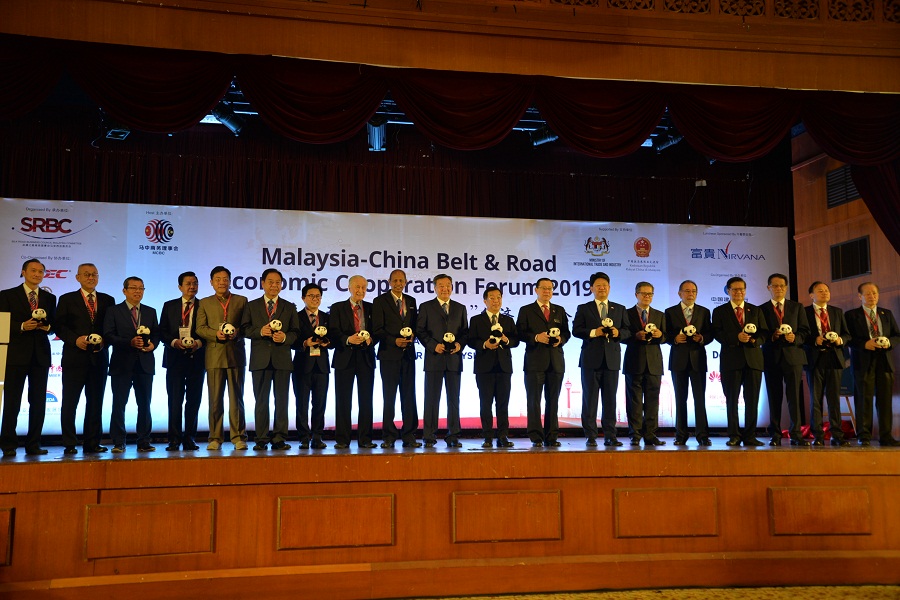
Chinese Ambassador to Malaysia Bai Tian (2nd R), and Tan Kok Wai (2nd L), Malaysia's special envoy to China and chairman of the Malaysia China Business Council, pose for a group photo during the Malaysia-China Belt and Road Economic Cooperation Forum in Kuala Lumpur, Malaysia, Aug. 8, 2019. (Xinhua/Wang Dawei)
"We will continue to facilitate Chinese investment into Malaysia particularly the high-tech Industries and innovation-based services," Malaysian Finance Minister Lim Guan Eng said, adding that Malaysia is keen to learn from Chinese advances in artificial intelligence (AI), advanced materials, robotics and cloud computing.
KUALA LUMPUR, Aug. 8 (Xinhua) -- Malaysia has benefited from the China-proposed Belt and Road Initiative (BRI) and is looking forward to more cooperation in trade and investment, officials said here Thursday.
The BRI is an economic initiative formulated by China to enhance its connectivity with the world, Malaysian Finance Minister Lim Guan Eng said while addressing the Malaysia-China Belt and Road Economic Cooperation Forum.
"Malaysia supports the BRI to encourage sustainable development throughout Asia and bring the region closer together through a transparent and fair mechanism," he told the audience from business community of both countries.
He said Malaysia remains a reliable trade partner for Chinese exporters in the current global climate and is the ideal gateway to the Association of Southeast Asian Nations (ASEAN).
The strong economic bond between Malaysia and China has been evidenced by the fact that China has remained the country's biggest trade partner, and Malaysia is receiving increasing number of Chinese tourists which recorded a 7.6 percent increase in the first 5 months of this year.
Lim also reaffirmed Malaysia's commitment to facilitating the entry of Chinese businesses into the country with the aim of drawing high technology companies in particular.
"I am happy that Huawei has its regional hub located in Kuala Lumpur, with more than 2,500 employees throughout Malaysia. Reputed as the leader in 5G technology, Huawei and other technology companies have a role to play in aiding Malaysia in implementing Industry 4.0 technology, especially 5G, throughout our society."
"We will continue to facilitate Chinese investment into Malaysia particularly the high-tech Industries and innovation-based services," he said, adding that Malaysia is keen to learn from Chinese advances in artificial intelligence (AI), advanced materials, robotics and cloud computing.

Malaysian Finance Minister Lim Guan Eng (8th R), Chinese Ambassador to Malaysia Bai Tian (7th R), Tan Kok Wai (9th R), Malaysia's special envoy to China and chairman of the Malaysia China Business Council, and guests pose for photos during the Malaysia-China Belt and Road Economic Cooperation Forum in Kuala Lumpur, Malaysia, Aug. 8, 2019. (Xinhua/Zhu Wei)
Tan Kok Wai, Malaysia's special envoy to China and chairman of the Malaysia China Business Council which hosted the forum, said Malaysia has fully embraced the BRI as the initiative would ease and expand the lines of communications between both countries and the ASEAN region as a whole.
"Under the mutual collaboration on the Belt and Road development between Malaysia and China, the Malaysian entrepreneurs, especially the local Chinese business sectors will play an important role," said Tan.
Proposed by China in 2013, the Belt and Road Initiative refers to the Silk Road Economic Belt and the 21st century Maritime Silk Road, which aims at building trade and infrastructure networks connecting Asia with Europe and Africa along the ancient trade routes of the Silk Road.



